#jthm dillon
Explore tagged Tumblr posts
Text




#jthm#art#drawing#johnny c#johnny#nny#jthm johnny#i feel sick#devi d#tess r#edgar vargas#jthm dillon#the flesh
274 notes
·
View notes
Note
Tess and Dillon (From JtHM) as kismesis pls

Tess and Dillon from Johnny the Homicidal Maniac are kismeses!
19 notes
·
View notes
Text
Anyone else wonder how this guys band mates look?


“omg. He’s in a band? So hot”
18 notes
·
View notes
Text
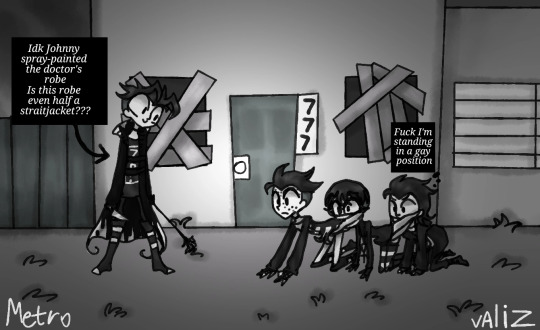
My au??? human centipede au
I drew it as a joke and it just happened to come to my mind
#jthm#jthm johnny#jthm jimmy#jthm tess#jthm dillon#johnny the homicidal maniac#johnny c#artists on tumblr#art
26 notes
·
View notes
Link
Chapters: 10/17 Fandom: Johnny the Homicidal Maniac Rating: Explicit Warnings: Creator Chose Not To Use Archive Warnings Relationships: Edgar Vargas/Jimmy "Mmy", Jimmy "Mmy"/Edgar Vargas Characters: Edgar Vargas, Jimmy "Mmy", Devi D., Tenna (JtHM), Tess R., Johnny "Nny" C. Additional Tags: Emotional Manipulation, Mass Murder, Suicide, Drug Dealing, Implied/Referenced Drug Use, Unreliable Narrator, Illustrated, Multiverse, Angst Series: Part 3 of End Times Summary:
So the world at large hadn't burned the night his father had predicted it would. That didn’t mean that the End wasn’t coming.

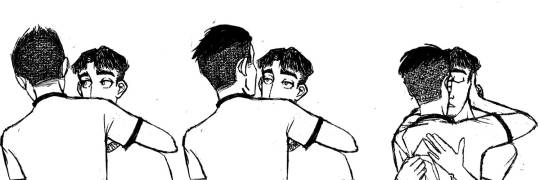
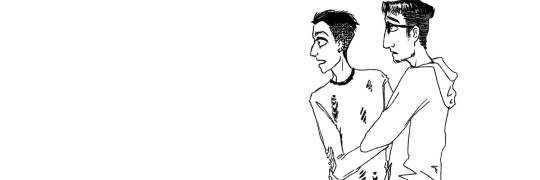



#edgar vargas#jthm mmy#jthm darkness#mmygar#fanfic: rapture#jthm dillon#jthm tess#artwork#jimmy mmy#Devi D#jthm Devi#jthm#johnny the homicidal maniac
18 notes
·
View notes
Text
JTHM (devnny) 2000s-2010s AU

they're alt teenagers who met through art classes and fell in love
i have to draw tenna and jimmy next........ maybe edgar, tess and dillon after them
#jthm au#my art#jthm#johnny the homicidal maniac#johnny c#devi d#this was inspired by me and my gf's relationship btw
20 notes
·
View notes
Text

#i do not accept criticism#devi d#anne gwish#reverend meat#dillon jthm#tenna jthm#jimmy jthm#señor diablo#tess r#johnny the homicidal maniac#johnny c#jthm nny#jthm#alignment chart
124 notes
·
View notes
Text

Finally submitting my JTHM fanart on here and the first one up is this jerk lmao
23 notes
·
View notes
Conversation
Nny: I have horse-like reflexes!
Dillon: Don't you mean "cat-like"?
Nny: *Kicks Dillon in the jaw*
79 notes
·
View notes
Text

132 notes
·
View notes
Text
JtHM Body Count
I was curious as to just how many people Nny’s killed so I went through my director’s cut and counted.
Confirmed kills: ≥ 109
Implied kills: ≥ 30-105
This is just the body count from the main JtHM series and strips. Counting all other canon sources such as Nny’s Twitter, that number is much, much higher.
Bonuses
Other captives: ≥ 52 that he didn’t get around to killing himself but who presumably still died from the events in issue 5
Released: 1 (weenie taste tester)
Escaped: 1 (Devi)
Breakdown (spoilers)
Killed “on screen” or whose murders were mentioned in text: Survey Guy, 9 Taco hell patrons, Edgar (💔), Ugly On the Inside, ≥ 3 “others” he “immortalized the moment” with, Self-Appointed Beverage Dictator, ≥ 26-39 Cafe le Prick patrons, Shit In Pants, pedophile, girl in head clamp torture device, flower vendor, old woman, ice cream man, hell’s chauffeur, Jimmy, “Kick Me” sign guy
Presumably killed but not shown: “cat on crack” person, beheaded husband stuffed full of human skulls, guy attached to the circuit breaker, mall girl drained of blood, 10 “friends who came over,” ≥ 10-18 Things That Make Noise, party clown, 16 chained up captives, 4 Cafe le Prick patrons, guy in head clamp torture device, 5-80 cheerleaders, ≥ 1 person he dug a grave for, Krik’s 2 friends, salad tongs victim, power drill victim, ≥ 2 of hell’s chauffeur’s friends, whoever’s blood was all over him while buying a Brainfreezy
Confirmed/implied kills from strips prior to the series: ≥7
Captives still in the house when the wall monster escaped: ≥49 cocooned people, Dillon, Krik, Tess
Why yes, yes I am a massive nerd, thank you.
112 notes
·
View notes
Text
Movies mentioned in JTHM
That other post I wrote has got me thinking about JTHM and movies and I started thinking about all the ones that actually get called out by name in it. I was hoping I would have actually seen more of them so I could talk about what parallels (if any) are actually being drawn here but I’ve only seen about three of these lol. But if anyone’s interested here’s just a list of all the movie references I caught in JTHM:
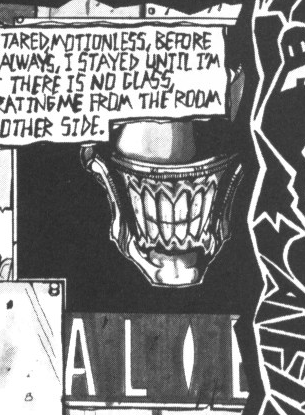
Aliens (1986) or possibly Alien (1979) (looks more like the logo for Aliens tho) - poster on Johnny’s wall

Edward Scissorhands (1990) - another poster on Johnny’s wall in the same panel

Brazil (1985) is the movie Johnny and Devi saw on their date
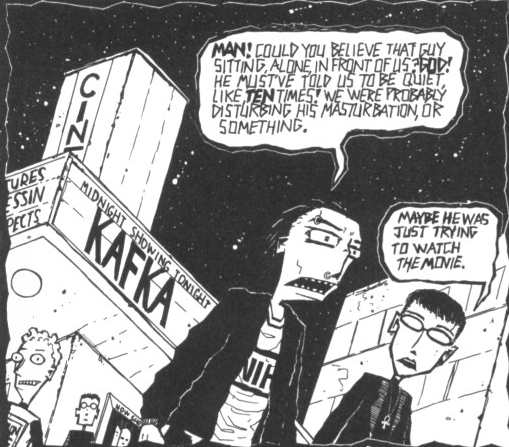
Nny “met” Tess and Dillon at a showing of Kafka (1991)
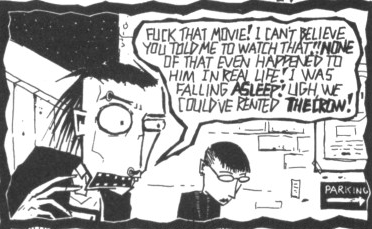
And in the very next panel Dillon mentions The Crow (1994)

Which also gets parodied in this poster on Anne Gwish’s wall
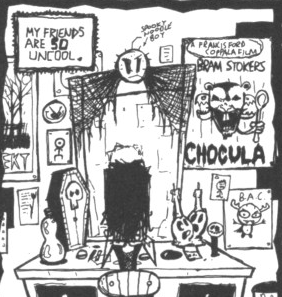
As well as Bram Stoker’s Dracula (1992)

And of course, Nny quotes The Fly (1986) (which is actually a remake of a movie from 1958, but I’m pretty sure the line he quotes is only in the 1986 one).
Feel free to add on if I missed anything!!
#jthm#johnny the homicidal maniac#jhonen vasquez#my posts#long post#i swear there's another alien reference somewhere secret that i noticed a long time ago but i couldn't find it again for the life of me#i also thought he had an x files poster at one point but i must have made that up because *i* love the x files
155 notes
·
View notes
Text

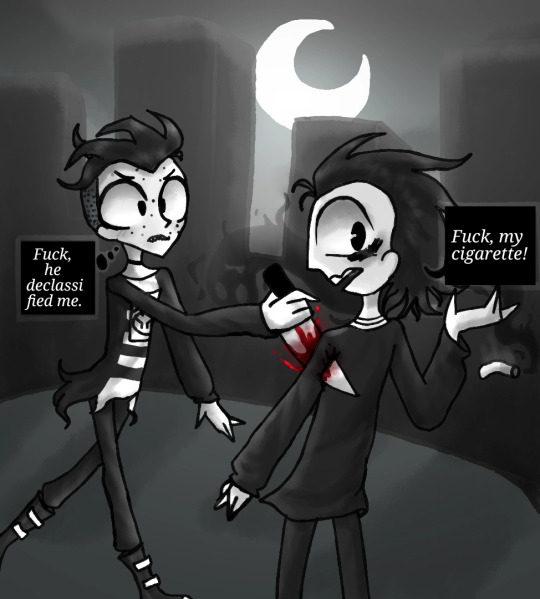
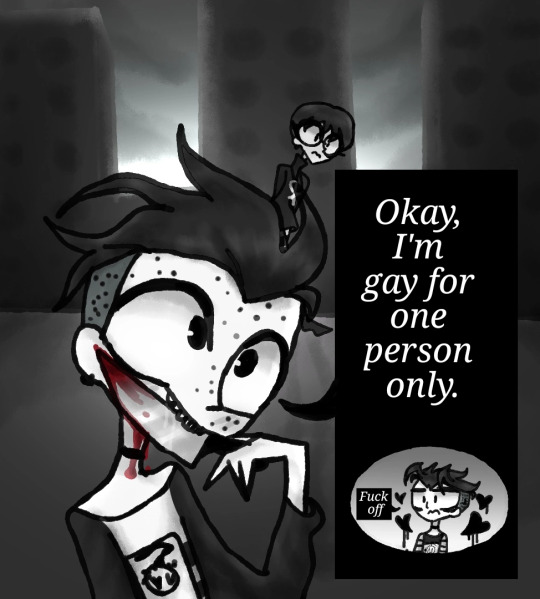

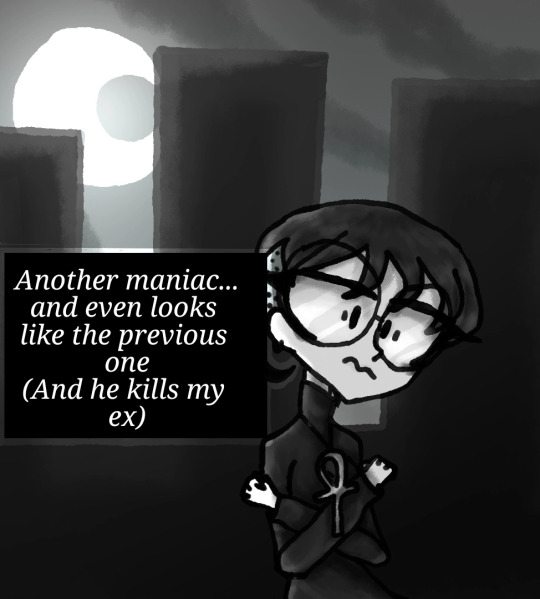

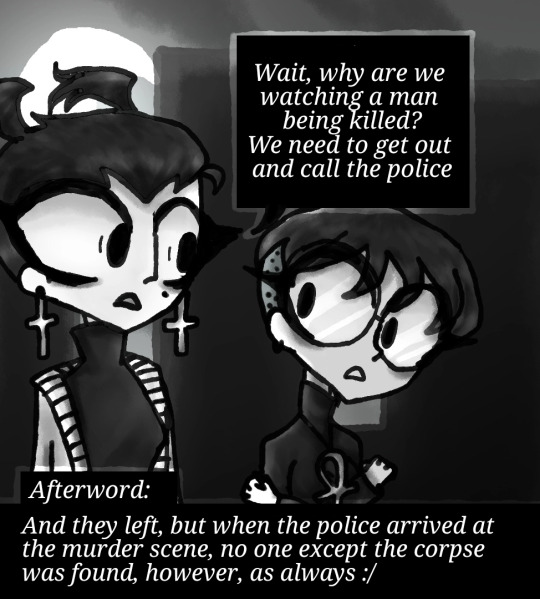
I had to tinker a bit over this translation of my own mini-comic
21 notes
·
View notes
Photo


Bought a fountain pen and i think i messed up by buying one with ink cartridges instead of a normal one i can just dip. This is me trying it out anyway.
Redrew a panel from I Feel Sick and one from JTHM. Anyone remember Dillon? lol yeah me neither.
263 notes
·
View notes
Conversation
Tess: Wait, do you guys know anything about chicks?
Dillon: Fowl? No.
Dillon: Women?
Dillon: ...no.
29 notes
·
View notes
Quote
Hold up. I’m not incompetent. I just don’t try.
Dillon
24 notes
·
View notes